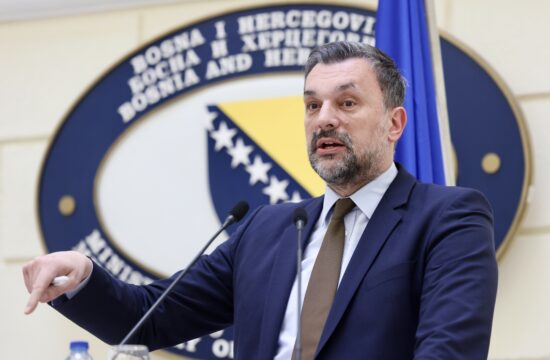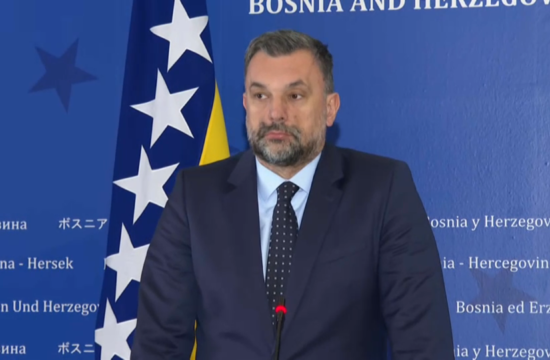
US Assistant Secretary of State for Europe and Eurasia James O'Brien gave a speech at the Faculty of Political Sciences in Sarajevo. He recalled how he started working on the "case" of Bosnia and Herzegovina in 1992 and that he has been an old friend of Bosnia and Herzegovina since then. He spoke about a serious threat that comes from within and warned: "BiH risks missing the next train to Europe” due to personal interests of its political leaders. Pročitaj više
“My experience with BiH started at a difficult point in the country’s history. In January 1992, I was assigned to be the US State Department lawyer responsible for the laws of war, crimes against humanity, and genocide. When war came to Bosnia and Herzegovina that April I catalogued the crimes, collected witness statements and evidence, and helped create the International Tribunal. Once the US started to lead peace talks, I served as the lead lawyer on the peace talks between Bosniaks and Croats, leading to the Washington Agreement in 1994, and then was involved in Dayton in 1995 and as the presidential envoy under President Clinton. I started coming to Sarajevo and much of the rest of Bosnia and Herzegovina almost 30 years ago. I love to return and see the progress in the country that I first saw through witness statements,” he said.
He noted that he wanted to speak as a long-time friend of the country, “all the country – about an opportunity, about a serious threat that comes from within the country, and then to propose a course of action.”
“My concern is simple: BiH is at risk of missing the next train to Europe due to the self-interest of its political leaders. It also risks being torn apart by secessionist threats from the Republika Srpska (RS),” O’Brien said.
Key moment
The US has always wanted to see the Western Balkans integrated into Euro-Atlantic institutions, integrated into a Euro-Atlantic future, he said, pointing out that much progress has already been made.
“We are coming to another key moment of opportunity for progress. The EU has announced its intention to open accession talks with 9 countries. As President von der Leyen said last week, in March there will be pivotal moment for BiH when the European Council will decide whether BiH is ready to take the next step. The United States fully supports BiH’s integration into Euro-Atlantic institutions, including the EU. Progress in enlargement talks with Ukraine and Moldova creates momentum of a kind we have not seen since the last major round of EU enlargement in 2007. The opportunity is real, but once this train moves there may not be another for some time. Enlargement will take time, however. That is why the EU has announced its intention to create a Growth Plan for the Western Balkans. It is simple and available soon: in exchange for reforms the EU will allow BiH citizens to join parts of the Single Market. It will even provide some funding to help with the reforms and integration, probably just under 1 billion euro for BiH alone,” the Assistant Secretary stated.
He expressed the hope that Bosnia will join the Western Balkans countries, which agreed in Skopje to reduce the costs of transferring funds, expand the range of movement of goods through green corridors, and implement measures from the Berlin process so that people can be employed across borders.
“Why does this matter? Because BiH is at risk of failing. By some measures, 47% of your population doesn’t live here. There is no greater indictment of political leadership than that. What’s more, according to ‘The Catch-Up Index,’ BiH’s per capita GDP is just one third of the EU average, and there has been very little convergence over the last decade. In addition to that, BiH attracts the lowest share of foreign direct investment relative to its GDP of any country in the Western Balkans. The youth unemployment rate is around 30 percent. I could go on, but the people of this country know these things better than anyone else. They live the reality of these figures every day. The opportunity provided by the EU can change that, if BiH can overcome its current challenges,” O’Brien added.
He also mentioned the internal challenges speaking about “secessionist talk.”
“Let me be perfectly clear on this point: the United States strongly supports the sovereignty, territorial integrity, and multiethnic character of Bosnia and Herzegovina. Calls to create new boundaries or change internationally recognized borders, attempts to stoke and celebrate ethnic and nationalist violence, defiance of core institutions like the Constitutional Court – these actions anti-Dayton, they are unconstitutional, and they are dangerous. We will respond to anti-Dayton and unconstitutional actions, and we will not allow malign actors to tear the state apart,” he warned.
O’Brien stressed that this is nothing personal but a matter of the interests of both countries.
“Some leaders seem to feel that they are larger when their names are said by international officials, and they enjoy attacking international representatives by name. This is foolishness. In my remarks I will separate the behavior from the person, naming individuals only when necessary. It is true that Dayton created a complicated government structure with many opportunities to block initiatives, but it also pointed a way forward.
• It requires groups to resolve disputes through the Dayton system, not outside it or by threatening to leave it.
• It makes clear that BiH’s future is in Europe and that the state will evolve as needed to help that happen. The state-building process that followed Dayton’s signature, and that resulted in reforms to BiH’s state structure over time, was and is part of Dayton.
• The Constitution also repeatedly says that all officials and institutions in BiH will uphold European standards and international law as part of their official duties.
This is the structure and fabric of the Constitution, and any official who suggests that there is some other source of law is deviating from Dayton. I know. I was there. I was the lawyer who worked with the parties at Dayton to write it,” he stressed.
He then went through several provisions of Bosnia’s Constitution:
“ In 2001, BiH signed the Agreement on Succession Issues of the Former Socialist Federal Republic of Yugoslavia (SFRY), which was ratified by the BiH Parliamentary Assembly and assigned state property to BiH, not to the Entities. There’s a way to discuss ownership of property by bringing it up in the relevant institutions. Still, it’s clear that the starting point is: that property belongs to the state.
The Constitution also made clear that BiH was to allow for the unrestricted movement of people, goods, services, and capital inside the country. Article 1, paragraph 4 says:
Neither Entity shall establish controls at the boundary between the Entities.
Some are now talking about RS independence or the “independence of the RS within BiH,” and about imagining controls at the IEBL. This invents an “Original Dayton” that promises to bring back the roadblocks, harassment, and barricades featured in the war in place of the words of the actual Dayton, which removed them. This is laughably bad law but dangerous in reality. through a few provisions to illustrate the point. Article I, paragraph 1 – kind of where things start – says that: The Republic of Bosnia and Herzegovina, the official names of which shall henceforth be “Bosnian and Herzegovina” …shall continue its legal existence … with its internal structure modified as provided herein… .The entities are subordinate to the state of Bosnia and Herzegovina, and to be crystal clear, the Republika Srpska is not a state and does not enjoy the attributes of statehood. By continuing the legal existence of its predecessor, BiH maintained its role in international organizations and agreements.”





Kakvo je tvoje mišljenje o ovome?
Budi prvi koji će ostaviti komentar!